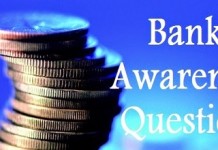Hello Aspirants,
Welcome to Banking Awareness Quiz in AffairsCloud.com. Here we are creating quiz covering important questions which are common for all the bank exams and other competitive exams.
- Which of the following is the most active segment of the money market in India?
A. Commercial Paper(CP)
B. Certificate of Deposit(CD)
C. Call Money
D. All of the above
E. None of the AboveC. Call Money
Explanation:
Call money is short-term finance repayable on demand, with a maturity period of one to fourteen days or overnight to fortnight. - SEPA Stands for ______
A. Scottish Environment Protection Agency
B. Single Euro Payments Area
C. Scottish Environment Protection Area
D. Single Euro Payments Agency
E. None of the AboveB. Single Euro Payments Area
Explanation:
The Single Euro Payments Area (SEPA) is a payment-integration initiative of the European Union for simplification of bank transfers denominated in euro. - The paid-up capital of non-scheduled bank is less than _____
A. Rs. 10 lakh
B. Rs. 20 lakh
C. Rs. 15 lakh
D. Rs. 5 lakh
E. None of the AboveD. Rs. 5 lakh
Explanation:
Banks not under in the second schedule of RBI Act, 1934 are called non-scheduled banks.
Banks with a reserve capital of less than 5 lakh rupees qualify as non-scheduled banks. Unlike scheduled banks, they are not entitled to borrow from the RBI for normal banking purposes, except, in emergency or “abnormal circumstances.
Jammu & Kashmir Bank is an example of a non-scheduled commercial bank. - The paid up capital and collected funds of scheduled bank must not be less than _________
A. Rs. 10 lakh
B. Rs. 20 lakh
C. Rs. 15 lakh
D. Rs. 5 lakh
E. None of the AboveD. Rs. 5 lakh
Explanation:
Banks under in the second schedule of RBI Act, 1934 are called scheduled bank.To qualify as a scheduled bank, the paid up capital and collected funds of the bank must not be less than Rs.5 lakh. Scheduled banks are eligible for loans from the Reserve Bank of India at bank rate, and are given membership to clearing houses. - Co-operative banks are regulated by the Reserve Bank of India under _________
A. Banking Regulation Act, 1949
B. Banking Laws (Application to Co-operative Societies) Act, 1965
C. Both (A) and (B)
D. Negotiable Instrument Act–1881
E. None of the AboveC. Both (A) and (B)
Explanation:
Co-operative banks are regulated by the Reserve Bank of India under the Banking Regulation Act, 1949 and Banking Laws (Application to Co-operative Societies) Act, 1965 - All banks registered under the ___________ are considered co-operative banks.
A. Banking Regulation Act 1949
B. The Bankers’Books Evidence Act–1891
C. Cooperative Societies Act, 1912
D. Both (B) and (C)
E. None of the AboveC. Cooperative Societies Act, 1912
Explanation:
Co-operative banks operate in both urban and non-urban areas. All banks registered under the Cooperative Societies Act, 1912 are considered co-operative banks. These are banks run by an elected managing committee with provisions of members’ rights and a set of “communally developed and approved bylaws and amendments.co-operative banks work on a “no profit, no loss” basis. - _______ refers to the system in which two are more banks are brought under common control by a device other than the holding company?
A. Chain Banking
B. Group Banking
C. Mixed Banking
D. Branch Banking
E. None of the AboveA. Chain Banking
Explanation:
Chain Banking refers to the system in which two are more banks are brought under common control by a device other than the holding company. - A negotiable instrument delivered to a person conditionally or for safe custody, but not for the purpose of negotiation is called _________
A. Protest
B. Escrow
C. Noting
D. All of the Above
E. None of the AboveB. Escrow
Explanation:
An escrow account is a temporary pass through account held by a third party during the process of a transaction between two parties. - __________ is the process by which the ownership of the credit instrument is transferred from one person to another.
A. Assignment
B. Endorsement
C. Negotiation
D. All of the Above
E. None of the AboveC. Negotiation
Explanation:
In documentary credit, usually the beneficiary’s bank which agrees to pay the beneficiary by purchasing a negotiable instrument (importer’s or buyer’s draft). Also called accrediting party. - A charge where there is neither the transfer of ownership nor the possession is called _______
A. Pledge
B. Hypothecation
C. Mortgage
D. Lien
E. None of the AboveB. Hypothecation
Explanation:
A charge against property for an amount of debt where neither ownership nor possession is passed to the creditor.
AffairsCloud Recommends Oliveboard Mock Test
AffairsCloud Ebook - Support Us to Grow
Govt Jobs by Category
Bank Jobs Notification


